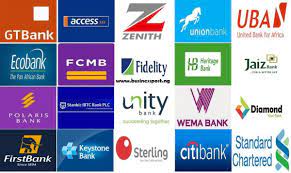
13 Banks Generate N2.04trn Interest From Customers Loans, Securities Investment
A total of 13 banks generated N2.04trillion interest from customers loans, Securities investments, among others in first half year ended June 30, 2022 on the back of Central Bank of Nigeria (CBN) hike in the Monetary Policy Rate (MPR) to 13 per cent as at June from 11.5 per cent in January 2022.
This represents an increase of 23 per cent from N1.66trillion generated by these 13 banks in the corresponding half year ended June 30, 2021.
In response to happenings in major global economies, Central Bank of Nigeria (CBN) joined other African economies to raise their benchmark rate to curb inflationary pressures.
The MPR was moved to 14 per cent in July 2022.
The World economy is experiencing increased levels of inflation due to rising energy and food prices. Global economy is projected to slow down to 2.9per cent in 2022 amidst heightening geopolitical tensions, attendant supply chain disruptions, and persistently high inflation.
Analysts noted that major global economies remain fragile post-COVID-19 pandemic, stressing that the first half of 2022 saw a slew of Central Bank rate hikes adopting monetary tightening measures amidst heightened inflationary pressures.
China has adopted a precautionary stance against negative spillover from other Central Bank’s actions.
Analysis revealed that the 13 banks generated N1.37trillion interest on loans & advances to customers in H1 2022 from N1.09trillion in H1 2021.
The 13 banks are: United Bank for Africa Plc (UBA), Access Holdings Plc, Zenith Bank Plc, FBN Holdings, Guaranty Trust Holdings Plc (GTCO), and Ecobank Transnational Incorporated (ETI).
Others are: Fidelity Bank Plc, Stanbic IBTC Holdings, FCMB Group Plc, Wema Bank Plc, Sterling Bank Plc, Union Bank of Nigeria Plc and Jaiz Bank Plc.
Most of the Tier-1 banks benefitted from interest hike in African countries where they operate. Specifically, ETI reported N317.23billion interest income in H1 2022 from N282.75billion in H1 2021, while its interest on loans & advances to customers increased to N168.72billion in H1 2022, representing an increase of 16.3 per cent from N145.08billion in H1 2021.
Another pan-African bank, Access Holdings reported N372.3billiion interest income in H1 2022, representing an increase of 16.5per cent from N319.7billion in H1 2022. Access Holdings also grew interest on loans & advances to customers by 37 per cent to N238.9billion in H1 2022 from N174.43billion in H1 2021.
Also, Zenith Bank grew its interest income by 19 per cent to N241.73billion in H1 2022 from N203.9billion in H1 2021, while UBA’s interest income rose by 16 per cent to N257.36billion from N222.63billion in H1 2021.
In addition, GTCO’s closed H1 2022 with N147.2billion interest income, representing an increase of 17 per cent from N126.09billion in H1 2021. The Holdings raked N103.3billion from loans to customers in H1 2022, representing an increase of 13.06 per cent from N91.37billion in H1 2021.
Read Also: FG To Banks: Take Opportunity Of AfCTA’s N3.4trn
GTCO in a presentation to investors/analysts attributed increase in interest income to 17per cent growth in average volumes of Earning Assets.
Further checks showed that the prime lending rate in the banking sector hit 12.29 per cent in June, the highest in 17-month, while the maximum lending rate dropped to 27.61 per cent in June 2022 from 27.65 per cent reported in January 2022.
Prime lending rates are the interest rate that commercial banks charge their most creditworthy customers, generally large corporations as maximum lending rate refers to interest charged by banks for lending to customers with a low credit rating.
The breakdown of June’s 2022 general maximum interest rate include: Access Holdings, 28.50 per cent; Ecobank Nigeria, 30.00 per cent, First Bank of Nigeria Limited, 24.00 per cent; FCMB 42per cent; Fidelity bank, 24per cent and Guaranty Trust Bank, 28 per cent.
Others are: Stanbic IBTC Bank, 1.3; Sterling Bank, 18; UBA, 19 per cent; Union Bank, 19.16 per cent; Unity Bank, 17 per cent; Wema Bank 25 per cent and Zenith Bank, 13.33 per cent.
The vice president, Highcap Securities Limited, Mr. David Adnori, explained that, “Most customers are only able to obtain loans at a rate higher than the prime rate mostly because they are more likely to default on a loan.
“An increase in the MPR by the MPC will result in an increase in the price (interest rate) you pay for borrowing and vice versa. Banks responded to this hike by jacking up their lending rate as well. The consequence of this is that borrowers would have to pay more when they borrow from the bank.”
He added that the recent decision by the MPC to hold MPR at 14per cent, implies that businesses looking to borrow to from banks to fund their operations would only be able to get loan facilities from banks at rates above 14per cent
“That is, the cost of borrowing would still remain on the high side. At MPR as high as 14per cent, businesses would continue to face high cost of borrowing and limited fund for local production,” he added.
Analysts at Vetiva research explained that, “we expect cost pressures and FX liquidity issues to persist throughout the year and this may dampen the anticipated price stability as industry players may have to pass the increased cost to consumers.
“Also, the recent hike in interest rates by the CBN will make borrowings more expensive and may weigh on investments in the real estate sector.
“Although the rising interest rate may affect demand, the ongoing construction activities by the public and private sectors would support cement demand through the remainder of the year.”
Analysts at FSDH Capital in a report titled, “Nigeria Macroeconomic Update 2022 Q2: Navigating through Bumpy Political Season and Tough Economic Headwinds,” explained that the aggressive inflationary pressure has necessitated the need for a higher interest rate in Nigeria and other countries.
They noted that the increase on the backdrop of the threat to the fragile recovery of the economy from the COVID-19-induced recession.
